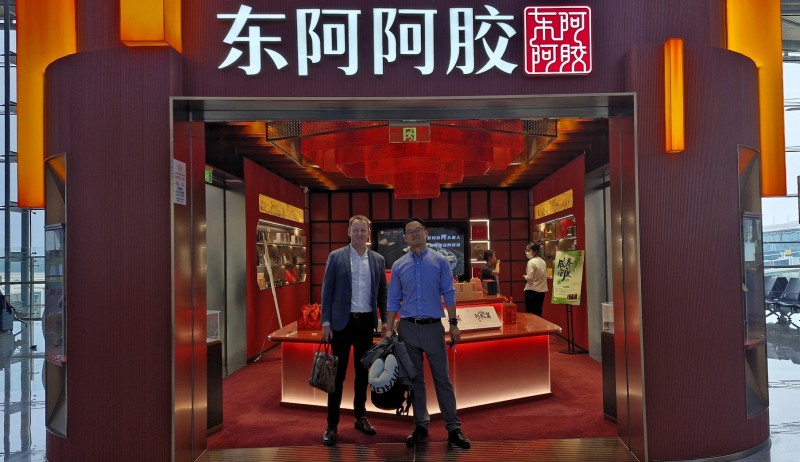Sep 16, 2025

New Zealand deer velvet has long been prized across Asia, but today its opportunity has never been clearer. The latest NZTE Health Supplements Outlook 2025 confirms that China is not just the second-largest health supplements market in the world but also one of the fastest-growing. Chinese consumers are hungry for products that strengthen immunity and fight fatigue, which plays naturally to our value proposition. Velvet has the chance to step into the mainstream of one of the world’s largest consumer markets.
A large, growing and underserved market
According to the NZTE study, China’s consumer health market reached USD 55.6 billion in 2024. It has grown at a compound rate of nearly 6 percent a year since 2020 – resilient growth in a country facing economic headwinds. But perhaps the most striking insight is that China’s per capita spend on supplements is still one of the lowest among the top 10 global markets. That means plenty of headroom for growth as supplements become part of everyday life.
In practical terms, that translates to millions of new consumers joining the category every year, particularly in urban centres where health, vitality and prevention are priorities. Importantly, the fastest growth is in function-specific supplements, not just general vitamins. For deer velvet, that’s a strong fit. Immunity is the number one reason Chinese people buy supplements, while anti-fatigue/energy recovery is one of the fastest-growing claims, up nearly 40 percent year-on-year on platforms like Tmall and Taobao. Velvet speaks naturally to both of these value drivers. Add in bone and joint health – another well-regarded benefit – and the alignment with consumer demand is clear.
“China is huge, but consumers are only just beginning to make health supplements part of daily life. Velvet fits the moment perfectly.”
- DINZ Trade Strategy Manager Damon Paling
What Chinese consumers value
The NZTE insights highlight four themes that matter most to Chinese supplement buyers:
- Functionality you can trust – Consumers want clear, proven benefits. Immunity, anti-fatigue, digestive health, and beauty-from-within are the top demands.
- Convenience and enjoyment – People prefer supplements that are easy to take and taste good. Gummies, chewables, oral liquids, and sachets are leading the way. Taste drives stickiness; poor taste leads to abandonment.
- Provenance and quality – Imported products still carry an aura of trust, especially when linked to a clean, natural origin like New Zealand. Safety, traceability and authenticity all matter.
- Lifestyle fit – Chinese consumers increasingly see supplements as part of a broader “live well” lifestyle. They want products that fit into daily routines and reflect their personal identity.
Velvet has an advantage in all of these areas – but only if it is delivered in the right format, with the right flavour, and with our provenance story told well.
Sales channels
It’s easy to think of e-commerce as the whole story in China. Certainly, platforms like Douyin (China’s TikTok) and Little Red Book are where new supplement trends emerge. Livestreaming has become the engine room of growth, with influencers selling directly to millions in a single broadcast.
But the NZTE study shows that the picture is more nuanced. Yes, e-commerce is growing, but much of that growth is in domestically registered products, not imported goods shipped via cross-border e-commerce.
For long-term scale and credibility, products need to be registered domestically in a manner which allows supplements to be sold nationwide in pharmacies, supermarkets and online platforms. Without that, velvet risks being stuck in a corner of the market, unable to compete at scale with mainstream products. This is the “behind-the-border” challenge: doing the work inside China to make sure velvet is recognised as a health food, not just an agricultural raw material.

DINZ Trade Strategy Manager Damon Paling and DINZ’s man in China, Felix Shen, at a Donge’e E-jiao store in one of China’s many airports or train stations.
Partnerships matter
Another clear insight from NZTE’s research is that the top 10 supplement brands account for 33% of total market value. For New Zealand velvet, the pathway forward is through partnerships with established Chinese companies who already know the terrain. DINZ has laid important foundations here: partnerships with Beijing Tong Ren Tang and Dong'e E-jiao, respected players in the traditional medicine sector, as well as engagement with companies like Hong Ji Tang in Jinan and China Sinopharm in Beijing, which are investing in wellness.
These partnerships are not just about sales channels – they are about credibility, regulatory expertise and consumer reach. They are the allies in velvet’s hero journey, helping it move from raw material to trusted household product. Farmers produce velvet that supports immunity and vitality. To succeed in China, it must overcome hurdles like regulation, consumer tastes and product formats. With the right partners, velvet can deliver health benefits to millions and return greater value to our industry.
Velvet is nature’s superpower
It has the story, the science and the trust of tradition. Consumers in China want immunity and anti-fatigue solutions. They want convenient formats that taste good. They value provenance and safety. Together we can work hand-in-hand with leading Chinese consumer brands to invest in registrations and support product innovation in taste and format.
If we succeed, velvet will no longer sit in China as a hidden agricultural slice. Velvet will be reborn as a modern, mainstream supplement – a trusted part of everyday life for millions of Chinese families. And when that happens, value can flow all the way back to the farmgate, securing the next generation of prosperity for our industry.

